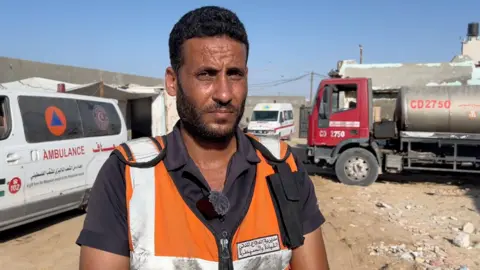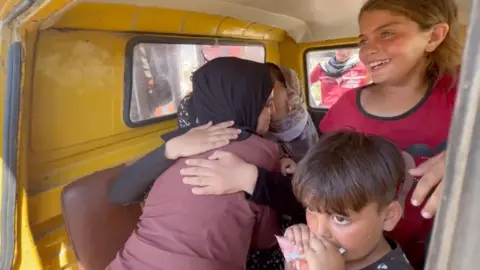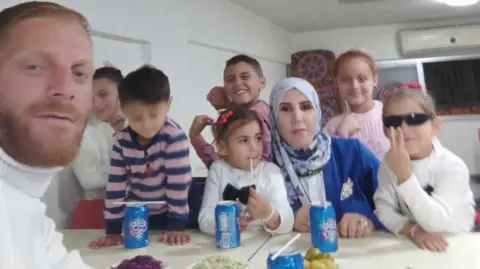Death and rubble fill streets of Tal Al-Sultan as rescuers dodge Israeli fire
The things they see. The dead girl lowered by a rope from a ruined building. She sways slightly, then comes to rest, legs folding beneath her on the rubble.
They see people and parts of people lying out in the open where the blast or the bullet caught them. Violent death in all of its contortions.
Bodies lying in the streets, in the blasted open sitting rooms of houses, under the rubble. Sometimes covered by so much concrete the men will never reach them, and only in the future when the war is over will somebody come and give them a decent burial.
The men of the Gaza Civil Defence cannot close their eyes to any of this. There is no shutting out the smell. Every sense is on alert. Death can come from the skies in an instant.
When the fighting in places like Shejaiya in eastern Gaza City, or Tal Al-Sultan, near Rafah, in the south, is as fierce as it has been in the last few days, the ambulances of the Civil Defence dare not venture out.
“Entering areas close to the Israeli occupation is dangerous, but we try to intervene to save lives and souls,” says Muhammed Al Mughayer, a local Civil Defence official.
He and his men seize any lull in the conflict to recover the dead and the wounded. Families constantly ask about missing relatives.

“It is very difficult to identify the bodies,” explains Mr Mughayer. “Some remain unidentified due to complete decomposition.”
Stray animals also prey on the corpses, tearing off clothes and scattering papers that might be used to identify them.
The ambulance crews are short of fuel. Two days ago one broke down in Tal Al-Sultan and had to be towed out, a nerve-wracking experience for the crews. The risk of being fired on by the Israeli forces, says Mr Mughayer, means seriously injured people often cannot be rescued.
“There is currently a report of an injured person near Al-Salihin Mosque from two days ago, but we can’t reach them due to delays in coordination. It may result in their death.”
Refugees are continuing to flee from Gaza city and areas like Shejaiya. Many have been displaced multiple times.
For them it is a world without laws or rules. World leaders express concern. But nobody is coming to rescue them. Nothing is more acute for these people than the sense that they can die at any moment.
Sharif Abu Shanab stands outside the ruins of his family home in Shejaiya with an expression that is part bewilderment, part grief.
“My house had four floors, and I can’t enter it,” he says. “I can’t take anything out of it, not even a can of tuna. We have nothing, no food or drink. They bulldozed all the houses, and it is not our fault. Why do they hold us accountable for the fault of others? What did we do? We are citizens. Look at the destruction around you…
“Where do we go, and to whom? We are thrown in the streets now, we have no home or anything, where do we go? There is only one solution and that is to hit us with a nuclear bomb and relieve us of this life.”
There are occasional glimpses of reprieve. The Al-Fayoumi family, arriving close to Deir Al Balah in central Gaza, were relieved to have escaped from Gaza City. This after a warning this week to evacuate from the Israel Defense Forces sent thousands of people onto the road south.

In the boiling heat of the asphalt road, without shade, family members were reunited with others who had gone ahead of them.
The new arrivals were given water and soft drinks. A boy sucked from a carton of juice, then squeezed it with all his strength to coax out a last few drops.
Nobody in the group took their survival for granted. So to see everyone alive, all in the one place, brought smiles and cries of happiness. An aunt reached into a car to hug her young niece. At first the child smiled. Then she turned her head and sobbed.
Where will they be tomorrow, next week, next month? They have no way of knowing. It depends on where the fighting moves next, on the next Israeli evacuation order, on the mediators and whether Hamas and Israel can agree a ceasefire.
These lines could have been written at any time in the last few months. Civilians dying. Taking to the roads. Hunger. Hospitals struggling. Talks about a ceasefire.
Since February, we have been following the story of Nawara al-Najjar whose husband Abed-Alrahman was among more than 70 people killed when Israeli forces launched an operation to rescue two hostages in Rafah.
They had fled Khan Younis 9km (6 miles) to the north, and took refuge closer to Rafah when bullets and shrapnel tore through the tented camp where they slept.

Nawara was six months pregnant when she was widowed, and taking care of six children, aged from four to 13. When a BBC colleague found her again today, Nawara was nursing her newborn baby, Rahma, just one month old.
She gave birth on a night of heavy airstrikes, rushed to the hospital by her in-laws.
“I kept saying: ‘Where are you Abed-Alrahman? This is your daughter coming into the world without a father.’” Baby Rahma has red hair like her dead father.
The Israeli advance into Rafah last month sent Nawara and her children fleeing again, back to their old home in Khan Younis. She struggled to settle there again.
“My husband’s things were there, his laugh, his voice. I couldn’t open the house. I tried to be strong. Then I took my children and opened the door, and we wandered around the house, but it was hard. I cried for my husband…He was the one who cleaned the house, cooked for us, made sure I was comfortable.”
There has been fighting around Khan Younis again in the last week. An Israeli air strike close to a school killed 29 people, local hospital sources say, and wounded dozens more.
But Nawara is adamant she will not move again. Here she is close to the memory of the man she loves. She imagines her husband as a still living presence. She sends texts to his phone: “I complain to him, and I cry to him…I try to reassure myself, telling myself that I need to be patient. I imagine he’s the one telling me.”
With additional reporting by Haneen Abdeen, Alice Doyard and Nik Millard.

Comments (0)